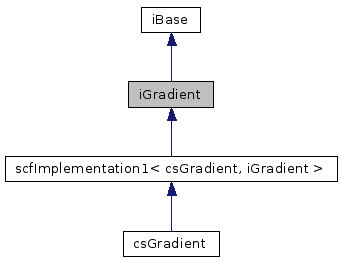iGradient Struct Reference
A simple color gradient. More...
#include <ivaria/gradient.h>
Inheritance diagram for iGradient:

Public Member Functions | |
| virtual void | Clear ()=0 |
| Clear all shades. | |
| virtual csPtr< iGradientShades > | GetShades ()=0 |
| Get the array of shades. | |
| virtual bool | Render (csRGBpixel *pal, size_t count, float begin=0.0f, float end=1.0f) const =0 |
| Interpolate the colors over a part of the gradient. | |
| virtual bool | Render (csRGBcolor *pal, size_t count, float begin=0.0f, float end=1.0f) const =0 |
| Interpolate the colors over a part of the gradient. | |
| virtual void | AddShade (const csGradientShade &shade)=0 |
| Add a shade. | |
Detailed Description
A simple color gradient.If you ever have worked with an image creation/manipulation program with a slightly higher niveau than Windows Paint then you probably know what this is.
Colors(here called 'shades') can be placed at arbitrary positions; although commonly a range of [0;1] is used, negative positions and positions larger than 1 are supported.
Shades contain actually two colors, a 'left' and 'right' one. You can think of this as, when approaching from one side, you'll get closer and closer to the respective color. If you step over a shade, you have the other color, but you're getting farther and farther from it (and towards the next color) when moving on. This feature can be used for sharp transitions; for smooth ones they are simply set to the same value.
This interface is implemented by csGradient.
Examples:
csRef<iGradient> grad; // Rainbow-ish grad->AddShade (csColor4 (1.0f, 0.0f, 0.0f, 1.0f), 0.0f); grad->AddShade (csColor4 (1.0f, 1.0f, 0.0f, 1.0f), 0.2f); grad->AddShade (csColor4 (0.0f, 1.0f, 0.0f, 1.0f), 0.4f); grad->AddShade (csColor4 (0.0f, 1.0f, 1.0f, 1.0f), 0.6f); grad->AddShade (csColor4 (0.0f, 0.0f, 1.0f, 1.0f), 0.8f); grad->AddShade (csColor4 (1.0f, 0.0f, 1.0f, 1.0f), 1.0f); // German flag grad->Clear (); grad->AddShade (csColor4 (0.0f, 0.0f, 0.0f, 1.0f), 0.0f); grad->AddShade (csColor4 (0.0f, 0.0f, 0.0f, 1.0f), csColor4 (1.0f, 0.0f, 0.0f, 1.0f), 0.33f); grad->AddShade (csColor4 (1.0f, 0.0f, 0.0f, 1.0f), csColor4 (1.0f, 1.0f, 0.0f, 1.0f), 0.66f); grad->AddShade (csColor4 (1.0f, 1.0f, 0.0f, 1.0f), 1.0f);
- Todo:
- More shade management (e.g. getting, deleting of single shades.)
Definition at line 127 of file gradient.h.
Member Function Documentation
| virtual void iGradient::AddShade | ( | const csGradientShade & | shade | ) | [pure virtual] |
| virtual void iGradient::Clear | ( | ) | [pure virtual] |
| virtual csPtr<iGradientShades> iGradient::GetShades | ( | ) | [pure virtual] |
| virtual bool iGradient::Render | ( | csRGBpixel * | pal, | |
| size_t | count, | |||
| float | begin = 0.0f, |
|||
| float | end = 1.0f | |||
| ) | const [pure virtual] |
Interpolate the colors over a part of the gradient.
- Parameters:
-
pal Array of csRGBpixel the gradient should be rendered to. count Number of paletteentries to render.begin Start position. Can be anywhere in the gradient. end End position. Can be anywhere in the gradient.
- Remarks:
- At least 1 shade has to be present in the gradient to have this function succeed.
Makes heavy use of floating point calculations, so you might want to use this function in a precalc phase.
begindoesn't have to be smaller thanend.beginandendcan both lie completely 'outside' the gradient (i.e. both smaller/large than the first resp. last shade's position.)
Implemented in csGradient.
| virtual bool iGradient::Render | ( | csRGBcolor * | pal, | |
| size_t | count, | |||
| float | begin = 0.0f, |
|||
| float | end = 1.0f | |||
| ) | const [pure virtual] |
Interpolate the colors over a part of the gradient.
- Parameters:
-
pal Array of csRGBcolor the gradient should be rendered to. count Number of paletteentries to render.begin Start position. Can be anywhere in the gradient. end End position. Can be anywhere in the gradient.
- Remarks:
- At least 1 shade has to be present in the gradient to have this function succeed.
Makes heavy use of floating point calculations, so you might want to use this function in a precalc phase.
begindoesn't have to be smaller thanend.beginandendcan both lie completely 'outside' the gradient (i.e. both smaller/large than the first resp. last shade's position.)
Implemented in csGradient.
The documentation for this struct was generated from the following file:
- ivaria/gradient.h
Generated for Crystal Space by doxygen 1.4.7
